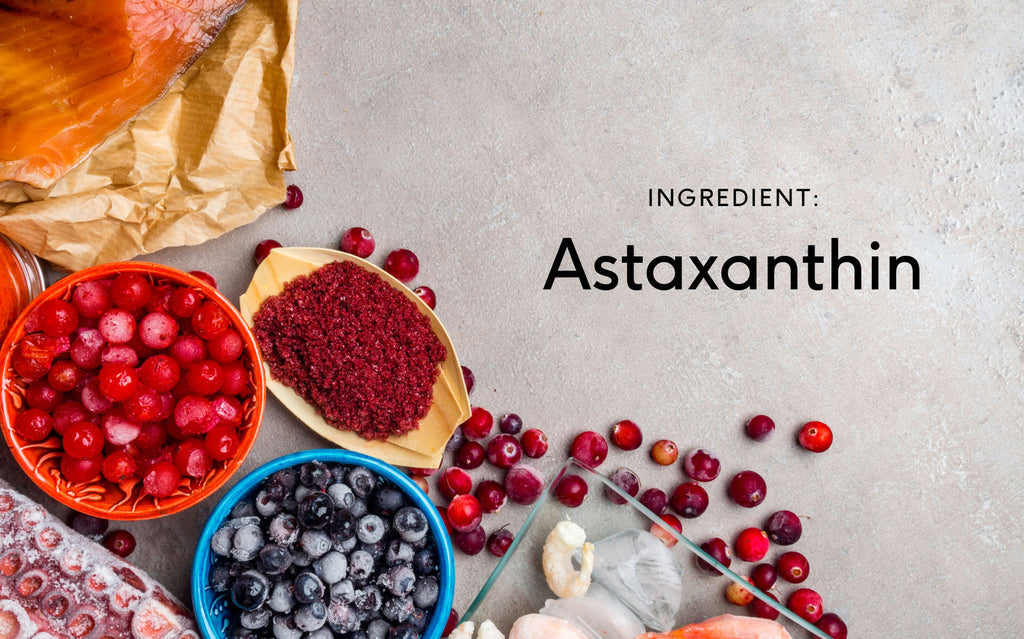Astaxanthin (NatAxtin®ME): Microalgae carotenoids

Astaxanthin is a powerful carotenoid antioxidant found in marine organisms such as microalgae, salmon, krill, and shrimp. It is widely recognized for its potent free radical-scavenging abilities, far surpassing the effectiveness of many other antioxidants, including vitamin C and vitamin E. Due to its unique molecular structure, astaxanthin provides broad-spectrum protection against oxidative stress, making it beneficial for skin health, cognitive function, cardiovascular wellness, and athletic performance.
What is Astaxanthin?
Astaxanthin is a fat-soluble carotenoid derived primarily from the microalga Haematococcus pluvialis, which produces it as a protective response to environmental stress. Unlike other antioxidants, astaxanthin does not become pro-oxidative in the body, meaning it continuously combats oxidative damage without breaking down into harmful byproducts. Its ability to cross the blood-brain and blood-retinal barriers allows it to provide protection to the brain and eyes, which are highly susceptible to oxidative stress.
Health Benefits of Astaxanthin
- Powerful Antioxidant Protection
Astaxanthin is known for its exceptional ability to neutralize free radicals, reducing oxidative damage to cells, DNA, and lipids. Studies indicate that it is up to 6000 times more potent than vitamin C, 550 times stronger than vitamin E, and 40 times more effective than beta-carotene in combating oxidative stress. This makes it highly valuable for overall cellular protection and longevity. - Enhances Skin Health and Anti-Aging
Astaxanthin has been shown to protect the skin from UV-induced damage, reducing signs of premature aging such as wrinkles, fine lines, and hyperpigmentation. It helps boost collagen production, maintain skin elasticity, and reduce dryness by improving moisture retention. Clinical trials suggest that astaxanthin supplementation can lead to visible improvements in skin texture, hydration, and resilience within weeks. - Supports Brain and Cognitive Function
Due to its ability to cross the blood-brain barrier, astaxanthin plays a crucial role in protecting neurons from oxidative stress and inflammation. It has been studied for its potential in reducing the risk of neurodegenerative diseases such as Alzheimer’s and Parkinson’s. Research indicates that astaxanthin enhances memory, focus, and cognitive processing, particularly in older adults. - Promotes Cardiovascular Health
Astaxanthin supports heart health by reducing oxidation of LDL cholesterol, a key factor in atherosclerosis and cardiovascular disease. It also helps improve circulation, blood vessel integrity, and blood pressure regulation. Clinical studies suggest that astaxanthin supplementation can enhance lipid profiles and reduce markers of inflammation, lowering the risk of heart disease. - Boosts Physical Performance and Recovery
Astaxanthin has been widely studied for its role in enhancing muscle endurance, reducing fatigue, and accelerating recovery in athletes and physically active individuals. By decreasing oxidative damage and inflammation in muscle tissues, it helps improve stamina, reduce exercise-induced muscle soreness, and support faster recovery times after intense workouts. - Supports Eye Health and Vision
As one of the few antioxidants capable of crossing the blood-retinal barrier, astaxanthin provides direct protection to the eyes. It helps reduce eye strain, improve visual acuity, and protect against age-related macular degeneration (AMD) and cataracts by shielding the retina from oxidative damage.
Scientific Support
- Antioxidant Power: Astaxanthin demonstrates superior antioxidant activity compared to other carotenoids, reducing oxidative stress in human cells (Sztretye et al., 2019).
- Skin Health: Clinical studies show that astaxanthin supplementation improves skin elasticity, reduces wrinkles, and protects against UV-induced aging (Li, X. et al., 2020).
- Cognitive Function: Research indicates that astaxanthin helps reduce inflammation and oxidative damage in brain cells, supporting cognitive function and neuroprotection (Galasso et al., 2018).
- Cardiovascular Benefits: Astaxanthin has been found to lower oxidative LDL cholesterol and improve blood flow, reducing the risk of cardiovascular diseases (Ciaraldi et al., 2023).
- Exercise Recovery: Studies suggest that astaxanthin supplementation enhances endurance, reduces muscle fatigue, and accelerates recovery after exercise (Hasani et al., 2024).
- Eye Health: Research highlights astaxanthin’s protective effects against retinal damage and its potential role in preventing macular degeneration (Luke Y., 2024).
References
- https://pmc.ncbi.nlm.nih.gov/articles/PMC6878783/
- https://pmc.ncbi.nlm.nih.gov/articles/PMC7168265/
- https://pmc.ncbi.nlm.nih.gov/articles/PMC6117702/
- https://dom-pubs.onlinelibrary.wiley.com/doi/full/10.1111/dom.15070
- https://www.sciencedirect.com/science/article/pii/S1756464624004791
- https://vitreavision.com/blogs/news/astaxanthin-the-super-antioxidant-for-superior-eye-health?srsltid=AfmBOop-qPxF_v1-bnkY-O5W0ds5xLevjgSrkhgm0M56E0Iv9qjSiL12
